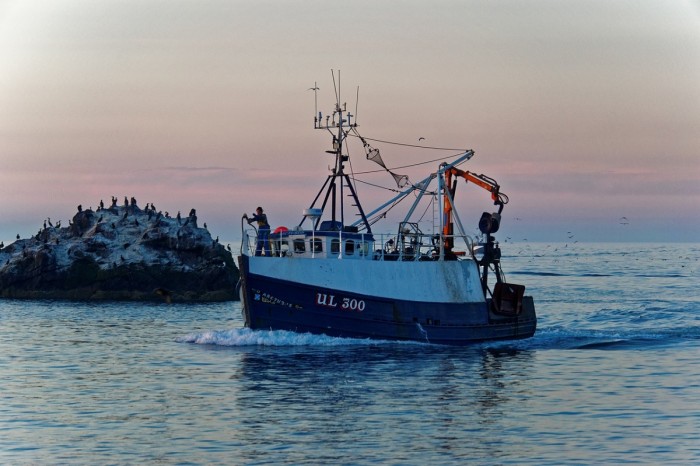Fishing Skipper
Kaiurungi Hao Ika
Alternative titles for this job
Fishing skippers are responsible for running a fishing boat. Responsibilities range from navigating the vessel and organising the crew to catching and processing fish.
Pay
Inshore fishing skippers usually earn
$49K-$80K per year
Deep-sea fishing skippers usually earn
$130K-$280K per year
Source: Maritime New Zealand, 2020.
Job opportunities
Pay
Pay for fishing skippers varies depending on the boat they operate and the fishing catch.
- Inshore fishing skippers usually earn between $49,000 and $80,000 a year
- Deep-sea fishing skippers can earn between $130,000 and $280,000.
Source: Maritime New Zealand, 2020.
- PAYE.net.nz website - use this calculator to convert pay and salary information
- Employment New Zealand website - information about minimum wage rates
(This information is a guide only. Find out more about the sources of our pay information)
What you will do
Fishing skippers may do some or all of the following:
- hire, direct and mentor crew
- navigate fishing boats to and from fishing grounds
- manage the deck and fishing duties
- record fish catches and keep quality records
- ensure the ship is properly equipped and maintained
- ensure the health and safety of the crew
- undertake maintenance and emergency repairs.
Having the opportunity to help people coming up the ranks develop their skills and their leadership qualities means a lot to me.

Vaun Williams
Fishing Skipper
Skills and knowledge
Fishing skippers will learn or have:
- vessel-handling skills and an understanding of their vessel's capabilities and equipment
- good navigational skills
- knowledge of the habits and location of the fish species they're catching
- the ability to identify where fish are using radar and echo-sounders
- knowledge of tides, coastlines, marine hazards and the weather
- an understanding of health, safety and hygiene rules and regulations
- knowledge of the Fisheries Act, Maritime New Zealand requirements, and fishing quotas.
Once you have enough experience and the right qualifications it's a good idea to do a few trips on other vessels within the company. You gain extra knowledge because every fishing vessel has different operating challenges.

Vaun Williams
Fishing Skipper
Working conditions
Fishing skippers:
- usually work 12-hour days, including weekends, when they are at sea
- may work at sea for periods ranging from a day to many weeks
- work in all types of weather, and in conditions that may be cramped and hazardous.
What's the job really like?

Vaun Williams
Fishing Skipper
Dedicated to a life at sea
Fishing skipper Vaun Williams says he never imagined becoming a skipper, but his love of life at sea inspired him to keep learning.
“As you get experience on the boat and show initiative you start progressing and working towards the next goal.
“I’d been working in forestry after leaving school, but my auntie’s partner needed a deck boy. Thinking it couldn’t be harder than the bush I went out on fishing trips and loved it.
“You have to do the hard graft, but it was a proud day when I told the whānau I was skipper on Sealord’s freezer trawler FV Aukaha.”
Healthy crew culture a skipper’s responsibility
“Your main focus is the safety of the crew and the vessel, but managing people is close behind”, says Vaun.
“I used to think catching fish was all about ‘going hard’. But it’s also about communication and being able to listen to your crew. A good team culture leads to a safer environment on board.”
Time off spent with family
“We’re away from home for up to four weeks at a time fishing in the South Island’s deep seas. But we have similar time off so it’s about prioritising your family when you’re on land.”
Vaun Williams is of Ngāti Kahungunu, Ngāti Porou and Ngāti Rongomaiwahine descent.
Entry requirements
To become a deep-sea fishing skipper you need to have a skipper fishing vessel unlimited (SFV-U) certificate.
To become an inshore fishing skipper you need to have a skipper restricted limit (SRL) certificate and a skipper fishing vessel limited (SFV) certificate.
Before training as a fishing skipper you must first pass a maritime eyesight and colour vision test.
You must also:
- have experience on a fishing vessel
- have approved qualifications in first aid, radar, firefighting and survival
- pass seafarer medical tests
- be able to prove you are a 'fit and proper person'.
Fishing skippers who run their own boat must hold a fishing permit and Annual Catch Entitlement (ACE) and/or quota shares.
Secondary education
There are no specific secondary education requirements to become a fishing skipper. However, biology, geography and maths are useful.
Personal requirements
Fishing skippers need to be:
- responsible, practical, and able to work well under pressure
- safety-conscious
- able to think on their feet and remain calm in emergencies
- good at communicating and leading others
- good at making decisions.
Useful experience
Useful experience for fishing skippers includes:
- work as a deckhand
- work as a first or second mate on a fishing boat
- navigational work
- other commercial fishing experience.
Physical requirements
Fishing skippers on inshore fishing boats need to be fit and healthy, as their role involves a lot of physical labour. Physical fitness is less important for deep-sea fishing skippers, as their role is usually confined to the wheelhouse.
Registration
Fishing skippers who own their own boat must register their vessel.
Find out more about training
- Maritime New Zealand
- 0508 22 55 22 - enquiries@maritimenz.govt.nz - www.maritimenz.govt.nz
What are the chances of getting a job?
Retiring fishing skippers create opportunities
Chances of getting work as a fishing skipper are good for those with experience. However, it can be difficult to enter the role. But with an ageing fishing skipper workforce, there are expected to be more opportunities as older workers retire.
Be prepared to start as a deckhand
The best way to become a fishing skipper is to get a job as a deckhand and work your way up the ranks, gaining the necessary maritime qualifications along the way.
According to the Census, 540 fishing skippers worked in New Zealand in 2018.
Some skippers own their boats, others are employed by fishing companies
On smaller inshore fishing boats, skippers either own the boat they operate or are directly employed by the owner. On larger deep-sea fishing boats, skippers are employed by the company operating the boat.
Most fishing boats registered in New Zealand operate in inshore waters.
Sources
- Ministry of Business, Innovation & Employment, ‘Occupation Outlook, Skippers and Marine Officers’, accessed October 2020,(www.occupationoutlook.mbie.govt.nz).
- Stats NZ, '2018 Census Data', 2019.
- Taylor-Smith, G, senior technical advisor, Maritime New Zealand, careers.govt.nz interview, October 2020.
(This information is a guide only. Find out more about the sources of our job opportunities information)
Progression and specialisations
Fishing skippers may progress to work on non-fishing vessels or move into onshore management roles, such as vessel manager, within a fishing company.
Fishing skippers usually specialise in either deep-sea or inshore fishing.
- Deep-sea Fishing Skipper
- Deep-sea fishing skippers may lead a large crew and play a managerial role on the fishing boat.
- Inshore Fishing Skipper
- Inshore fishing skippers may have just one crew member working for them. They have a more hands-on role in operating the boat and catching fish.
Last updated 27 March 2025


